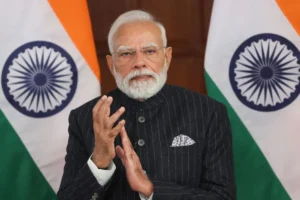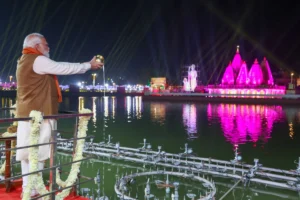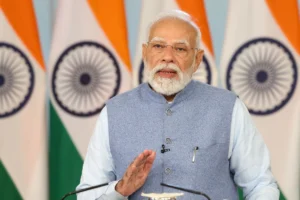
The Israeli military declared on Sunday that Hezbollah had attacked an air traffic control base in northern Israel and threatened “another war” with the militant organisation supported by Iran.
Secretary of State Antony Blinken was getting ready to visit Israel as part of his latest Mideast tour when he noticed an increase in fighting across the border with Lebanon as Israel battles Hamas militants in Gaza.
This created a new urgency for U.S. diplomatic efforts.
“This is a conflict that could easily metastasize, causing even more insecurity and even more suffering,” Blinken told reporters after talks in Qatar, a key mediator. The escalation of cross-border fighting between Israel and Hezbollah has complicated a U.S. push to prevent a regional conflict.
According to the Israeli military, a Hezbollah fire struck the important air traffic control base on Mount Meron on Saturday; however, due to the presence of backup systems, air defenses remained unaffected. It stated that all damage would be fixed and that no soldiers had been injured. However, it was among the most significant assaults carried out by Hezbollah in the months of hostilities that have accompanied Israel’s war in Gaza, and tens of thousands of Israelis were compelled to flee neighborhoods close to the Lebanese border.
The targeted murder of a senior Hamas leader in a Hezbollah stronghold in Beirut last week, which is thought to have been carried out by Israel, prompted Hezbollah to describe its rocket barrage as an “initial response.”
The Israeli military chief of staff, Lt. Col. Herzi Halevi, said military pressure on Hezbollah, a Hamas ally, was rising and it would either be effective “or we will get to another war.” Military spokesman Rear Adm. Daniel Hagari asserted that Israel’s focus on Hezbollah’s elite Radwan force was pushing it away from the border. Israel has mostly sought to limit the fighting in its north. Hezbollah’s military capabilities are far superior to those of Hamas. But Israeli leaders have said their patience is wearing thin, and that if the tensions cannot be resolved through diplomacy, they are prepared to use force. “I suggest that Hezbollah learn what Hamas has already learned in recent months: No terrorist is immune,” Prime Minister Benjamin Netanyahu told his Cabinet. We are determined to defend our citizens and to return the residents of the north safely to their homes.”
Also read: THESE Nighttime Visuals Of Ram Mandir Premises Will Take Your Breath Away; See Pics
Lower-intensity fighting along Israel’s northern border broke out when Hezbollah began firing rockets shortly after the October 7 Hamas attack on southern Israel triggered the war in Gaza, killing about 1,200 people, mostly civilians, and taking some 250 people hostage. Hezbollah has said its attacks aim to ease pressure on Gaza.
In a joint news briefing with Blinken, Qatar’s government acknowledged that the killing of the senior Hamas leader in Lebanon can affect the complicated negotiations for the potential release of more hostages held by Hamas in Gaza but “we are continuing our discussions with the parties and trying to achieve as soon as possible an agreement.”
Inside Gaza, the war against the militant group entered its fourth month on Sunday.
The Israeli military has signaled that it has wrapped up major combat in northern Gaza, saying it has completed dismantling Hamas’ military infrastructure there. Now it presses its offensive in the south, where most of Gaza’s 2.3 million Palestinians are squeezed into smaller areas in a humanitarian disaster while being pounded by Israeli airstrikes.
Netanyahu insists the war will not end until the objectives of eliminating Hamas, getting Israel’s hostages returned, and ensuring that Gaza won’t host a threat to Israel are met.
Biden administration officials have urged Israel to wind down its blistering air and ground offensive and shift to more targeted attacks against Hamas leaders.
More than 22,800 Palestinians have been killed and more than 58,000 wounded since the war began, according to the Health Ministry in Hamas-run Gaza. The death toll does not distinguish between combatants and civilians. Health officials say about two-thirds of those killed have been women and minors.
Also read: THESE Nighttime Visuals Of Ram Mandir Premises Will Take Your Breath Away; See Pics
Israel blames Hamas for civilian casualties because the group operates in heavily populated residential areas.
An airstrike near the southern city of Rafah killed two journalists on Sunday, including Hamza Dahdouh, the oldest son of Wael Dahdouh, Al Jazeera’s chief correspondent in Gaza, according to the Qatari-owned Arabic-language channel and local medical officials. Al Jazeera broadcast footage of Dahdouh weeping and holding his son’s hand. Israel’s military had no immediate comment. Al Jazeera strongly condemned the killings and other “brutal attacks against journalists and their families” by Israeli forces. Dahdouh also lost his wife, two children, and a grandchild in an Oct. 26 airstrike, and was wounded in an Israeli strike last month that killed a co-worker. “The world is blind to what’s happening in the Gaza Strip,” he said, blinking back tears.
Another airstrike hit a house between Khan Younis and the southern city of Rafah, killing at least seven people whose bodies were taken to the nearby European Gaza Hospital, according to an Associated Press journalist at the facility. One man hurried in carrying a baby and later walked the blanket-wrapped child to the morgue.
“Everything happening here is outside the realms of law, outside the realms of reason. Our brains can’t fully comprehend all this that is happening to us,” said a grieving relative, Inas Abu al-Najja, her quavering voice rising. Men worked the rubble with picks and bare hands.
Source: PTI
To read more such news, download Bharat Express news apps






















